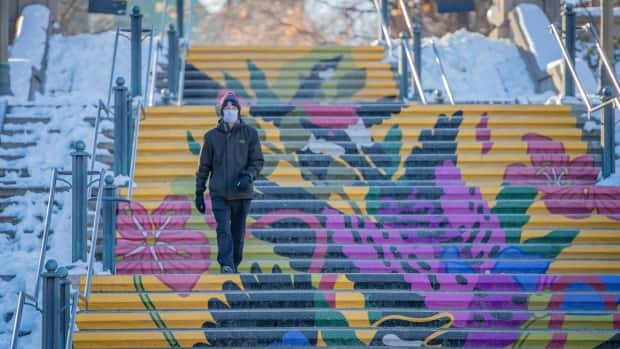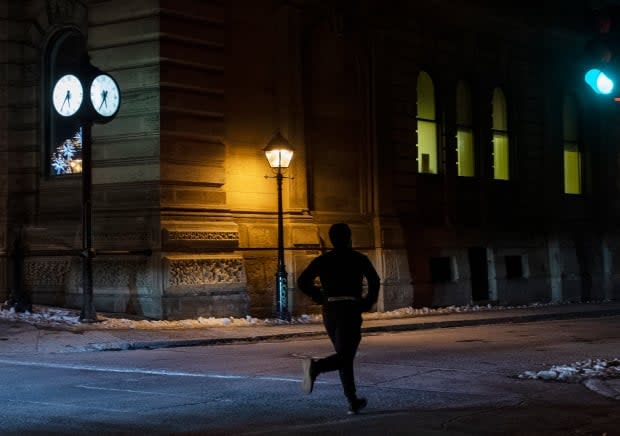What you need to know about COVID-19 in Ottawa on Sunday, Jan. 10

Recent developments:
Ottawa is reporting 184 new cases and two more deaths on Sunday.
The Ontario government is extending its free emergency child care program for front-line workers.
What's the latest?
Another 184 COVID-19 cases were logged by health officials in Ottawa on Sunday, one of the highest single-day case totals of the pandemic.
Officials also reported two more deaths, raising the city's death toll to 397. In western Quebec, 75 cases were reported on Sunday.
Gatineau, Que., and the Outaouais are now under a curfew from 8 p.m. until 5 a.m. as COVID-19 case totals in Quebec remain exceptionally high.
The curfew will be in place for 28 days, and those who are outside without a good reason could face fines of up to $6,000. Gatineau police said they issued 21 tickets linked to curfew violations on the first night.
The Ontario government is both expanding and extending a program that offers free emergency child care to front-line workers.
Need some creative and practical tips for the next two weeks of at-home learning, parents? Here you go.
How many cases are there?
In Ottawa, 11,378 people have tested positive for COVID-19. There are 1,202 known active cases, 9,779 resolved cases and 397 deaths linked to COVID-19.
Public health officials have reported more than 20,400 COVID-19 cases across eastern Ontario and western Quebec, including more than 17,400 resolved cases.
Ninety-five people have died of COVID-19 elsewhere in eastern Ontario and 133 people have died in western Quebec.
CBC Ottawa is profiling those who've died of COVID-19. If you'd like to share your loved one's story, please get in touch.
What can I do?
Ontario says people need to stop gathering and moving across the province to avoid more COVID-19 cases, hospitalizations and deaths — including in areas with low case counts.
Ottawa Public Health (OPH) says its COVID-19 spread is as high as it's ever seen, mostly because people are seeing others they don't live with and workplaces aren't following mask and distancing guidance.
Cases have also spiked in the Eastern Ontario Health Unit, where its medical officer of health says most cases would have been preventable by following the guidelines.
People are asked to only leave home when they need to, stay in their health unit and if they leave the province to isolate for 14 days upon returning.
No indoor events or private gatherings are allowed, except with people who live together or one other home for people living alone.
Outdoor gatherings can't have more than 10 people and should be distanced. Ottawa's new rules for outdoor recreation are now in effect.
In-person shopping is limited to essential businesses. Others can offer pickup and delivery.
Child-care centres are open, while day camps are not. The lockdown rules are in place in eastern Ontario until Jan. 23, although that could change for each health unit depending on the data.
Meanwhile, online learning for elementary students in eastern Ontario has been extended until Jan. 25.
In Western Quebec, residents are asked not to leave home unless it's essential, with an exception for people living alone. They can visit one other home.
Quebec's 8 p.m. to 5 a.m. curfew is now in effect, with fines of up to $6,000 for breaking the rules. Being from Ontario is not one of the exceptions.
While most gatherings are prohibited, some outdoor activities are allowed, as long as they're done with members of a household and abide by health guidelines.
Quebec has shut down non-essential businesses and has extended holiday secondary school closures until Jan. 18. Elementary school students can go back Monday.
There is no indoor dining at restaurants, while gyms, cinemas and performing arts venues are all closed. Travel from one region to another is discouraged throughout Quebec.
The plan is for those rules to be in place until Feb. 8.
Distancing and isolating
The novel coronavirus primarily spreads through droplets when an infected person coughs, sneezes, breathes or speaks onto someone or something. These droplets can hang in the air.
People can be contagious without symptoms.
This means people should take precautions such as staying home when they have symptoms, keeping hands and frequently touched surfaces clean, only socializing outdoors and maintaining distance from anyone they don't live with — even with a mask on.

Ontario has abandoned its concept of social circles.
Masks are mandatory in indoor public settings in Ontario and Quebec and should be worn outdoors when people can't distance from others. Three-layer non-medical masks with a filter are recommended.
OPH says residents should wear masks outside their homes whenever possible.
Anyone with COVID-19 symptoms should self-isolate, as should those who've been ordered to do so by their public health unit. The length varies in Ontario and Quebec.
Anyone returning to Canada must go straight home and stay there for 14 days. Air travellers have to show recent proof of a negative COVID-19 test.
Health Canada recommends older adults and people with underlying medical conditions and/or weakened immune systems stay home as much as possible and get friends and family to help with errands.
Symptoms and vaccines
COVID-19 can range from a cold-like illness to a severe lung infection, with common symptoms including fever, a cough, vomiting and loss of taste or smell. Children can develop a rash.
If you have severe symptoms, call 911.
Mental health can also be affected by the pandemic and resources are available to help.
COVID-19 vaccines have been given to health-care workers and long-term care residents in Ottawa and western Quebec. Vaccinations start in Hawkesbury next week.
About 10,000 Ottawa residents have received at least one dose as of Jan. 6. As of Jan. 8, western Quebec has given nearly 2,300 doses.
In Ontario, it's expected that will expand to priority groups such as older adults and essential workers in April, with vaccines widely available to the public in August.
Ottawa believes it can have nearly 700,000 residents vaccinated by August.
Quebec has a somewhat controversial policy of giving a single dose to as many people as possible rather than giving fewer people two doses.
WATCH | What scientists know about the new coronavirus variant:
Where to get tested
In eastern Ontario:
Anyone seeking a test should book an appointment.
Ontario recommends only getting tested if you have symptoms, if you've been told to by your health unit or the province, or if you fit certain other criteria.
In Ottawa, that criteria includes December travel from or through South Africa or the U.K. or close contact with someone that had.
People without symptoms but part of the province's targeted testing strategy can make an appointment at select pharmacies. Travellers who need a test have very few local options to pay for one.
Ottawa has 10 permanent test sites, with mobile sites wherever demand is particularly high.
The Eastern Ontario Health Unit has sites in Alexandria, Casselman, Cornwall, Hawkesbury, Rockland and Winchester. The Alexandria and Casselman sites temporarily close next week.
People can arrange a test in Picton by calling the centre or Bancroft, Belleville and Trenton, where online booking is preferred.
Kingston's main test site is at the Beechgrove Complex, another is in Napanee.
The Leeds, Grenville and Lanark health unit has permanent sites in Almonte, Brockville, Kemptville and Smiths Falls and a mobile clinic for smaller communities or people with problems getting to a site.
Renfrew County residents should call their family doctor or 1-844-727-6404 for a test or with any health questions Test clinic locations are posted weekly.

In western Quebec:
Tests are strongly recommended for people with symptoms and their contacts.
Outaouais residents can make an appointment in Gatineau seven days a week at 135 blvd. Saint-Raymond or 617 avenue Buckingham.
They can now check the approximate wait time for the Saint-Raymond site.
There are recurring clinics by appointment in communities such as Maniwaki, Fort-Coulonge and Petite-Nation.
Call 1-877-644-4545 with questions, including if walk-in testing is available nearby.
First Nations, Inuit and Métis:
Akwesasne has had more than 70 residents on the Canadian side of the border test positive and one death. More than 160 people have tested positive across the community.
Its curfew from 11 p.m. to 5 a.m. is back and it has a COVID-19 test site available by appointment only.
Anyone returning to the community on the Canadian side of the international border who's been farther than 160 kilometres away — or visited Montreal — for non-essential reasons is asked to self-isolate for 14 days.
The Mohawks of the Bay of Quinte had its only confirmed case in November. Kitigan Zibi logged its first in mid-December and has had more since.
People in Pikwakanagan can book a COVID-19 test by calling 613-625-2259.
Anyone in Tyendinaga who's interested in a test can call 613-967-3603.
Inuit in Ottawa can call the Akausivik Inuit Family Health Team at 613-740-0999 for service, including testing, in Inuktitut or English on weekdays.
For more information

